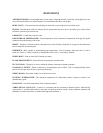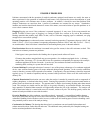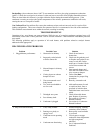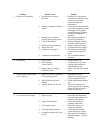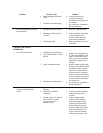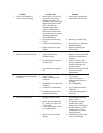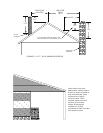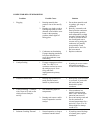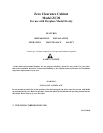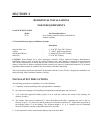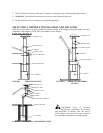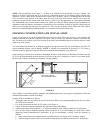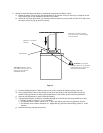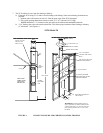
Problem
1. Plugging
2. Catalyst Peeling
3. Chemical Deactivation
4. Catalyst Masking—a catalyst
with a layer of fly ash or soot
which prevents catalytic
activity
5. Substrate Cracking-Thermal
Possible Cause
1. Burning materials that
produce a lot of char and fly
ash
2. Burning wet, pitchy wood or
burning large loads of small
diameter wood with the com-
bustor in the operating
position without light-off
taking place
3. Combustor not functioning.
If proper burning procedures
have been followed to no
avail, the combustor is not
functioning.
1. Extreme temperatures (above
1800
o
F or 1000
o
C) at
combustor surface can cause
the catalyst to peel. Over-
firing and flame
impingement are primary
causes
1. Burning large quantities of
trash, pressure treated
lumber or painted wood.
1. Not maintaining light-off
temperatures
2. Burning coal causes a sulfur
based compound to coat the
catalyst
1. Normal operation, as long as
combustor remains intact.
Solution
1. Do not burn materials such
as garbage, gift wrap or
cardboard
2. Burn dry, seasoned wood.
Don’t place the combustor
in the operating position
until temperatures are high
enough to initiate light-off.
It may be possible to burn
the accumulated soot or
creosote off by putting the
combustor in a partially
open-partially closed
position after a “hot” fire
has been started.
3. Replace combustor
1. If peeling is severe, remove
and replace combustor.
Avoid extreme temperatures
1. Burn quality wood available
in your area. If you decide
the catalyst has been
deactivated, replace
combustor.
1. Place combustor in a
partially closed position
after a “hot” fire has been
started to burn soot off.
2. Revert to burning wood and
fire the combustor at
elevated temperatures for a
period of 1 hour. (Five 20
minute high-fire startups
would do it)
1. If cracking causes blockage
of exhaust gases, replace
combustor
COMBUSTOR-RELATED PROBLEMS




